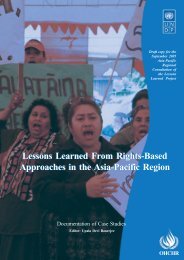View / Download - HRBA Portal
View / Download - HRBA Portal
View / Download - HRBA Portal
You also want an ePaper? Increase the reach of your titles
YUMPU automatically turns print PDFs into web optimized ePapers that Google loves.
Participation of the disabled population in elections in Afghanistan• The hope is that this study will be timelyand relevant to the ongoing democratictransition and associated general elections inAfghanistan;• It will also be in keeping with the MillenniumDevelopment Goals review currently under wayin Afghanistan;• The Joint Electoral Management Body (JEMB) toplan a review in the area.It follows that for concerted attention toparticipation, representation and empowerment ofdisabled persons in Afghanistan, the types andpatterns of exclusion and discrimination need to beadequately researched and understood, if we are todevise,fund,implement and supervise human rightsbasedprogrammes to address these issues.Objectives• Demographic focus:disabled women and men;• Thematic focus: participation and representation.3. LESSONS LEARNEDResearch method and limitationsMeasuring disability by statistical and ethnographictools is fraught with difficulty. Part of the reasonis that there is no clearly agreed definition ofdisability and because disability is a highly relativeand subjective factor.The Afghan government and internationalagencies, as well as some national NGOs, havecarried out or are carrying out surveys. However,the results of these surveys are still of a provisionalnature, or are based on small populations,anecdotal evidence or case studies. Theirmethodologies raise doubts on their reliability,validity and representativeness because of poorstandardization and quality control as wellas non-comparable estimates. Thus, little definitiveinformation may be gleaned on underlyingpatterns and causality from available data beyondgeneral inferences and broad estimates.In Afghanistan, research is complicated by theinsecurity prevailing in various parts of the countryand the legacy of decades of conflict; because ofthis, any serious qualitative or quantitative researcheffort is compromised. Reaching marginalizedsections of society, especially women, is a problemfor researchers. This study and its findings,particularly the emphasis it places on women andgender-related questions, are thus inevitablyaffected by the above limitations and, as this studyis still a work-in-progress, the results should beviewed as preliminary and non-prescriptive.As part of this study, UNDP Afghanistan and itspartner agencies investigated the propensity,prevalence and cause of various difficulties facedby persons with disabilities in voting and politicalparticipation. In doing so, the agencies applied thefollowing methods: a literature review, expert17



